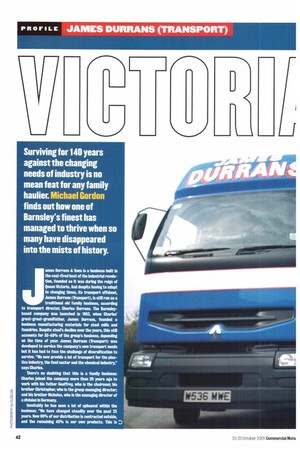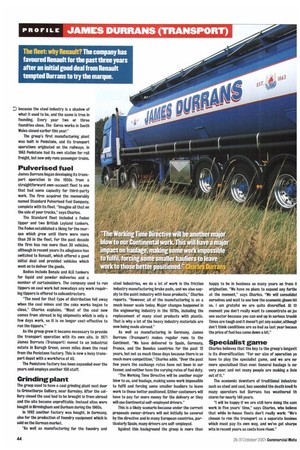Surviving for 140 years against the changing needs of industry
Page 42

Page 44

If you've noticed an error in this article please click here to report it so we can fix it.
is no mean feat for any family haulier. Michael Gordon finds out how one of Barnsley's finest has managed to thrive when so many have disappeared into the mists of history.
James Durrans & Sons is a business built in the coal-fired heat of the industrial revolution, founded as It was during the reign of Queen Victoria. And despite having to adapt to changing times, its transport offshoot, James Durrans (Transport), is still run as a traditional old family business, according to transport director, Charles Durrans, The Barnsleybased company was launched in 1863, when Charles' great-great-grandfather, James Durrans, founded a business manufacturing materials for steel mills and foundries. Despite steel's decline over the years, this still accounts for 30-40% of the group's business, depending on the time of year. James Durrans (Transport) was developed to service the company's own transport needs but it has had to face the challenge of diversification to survive. "We now provide a lot of transport for the plastics industry, the food sector and the chemical industry," says Charles.
There's no doubting that this is a family business: Charles joined the company more than 20 years ago to work with his father Geoffrey, who is the chairman; Hs brother Christopher, who is the group managing director; and his brother Nicholas, who is the managing director of a division In Germany.
Inevitably he has seen a lot of upheaval within the business: "We have changed steadily over the past 25 years. Now 60% of our distribution is contracted outside, and the remaining 40% is our own products. This is D
—_;) because the steel industry is a shadow of what it used to be, and the same is true in founding. Every year two or three foundries close. The Corus works in South Wales closed earlier this year" The group's first manufacturing plant was built in Penistone, and its transport operations originated on the railways. In 1863 Penistone had its own station for rail freight, but now only runs passenger trains,
Pulverised fuel
James Durrans began developing its transport operation in the 1950s from a straightforward own-account fleet to one that had some capacity for third-party work. The firm acquired the memorably named Standard Pulverised Fuel Company, complete with its fleet. "Imagine all that on the side of your trucks," says Charles.
The Standard fleet included a Foden tipper and two British Leyland tankers, The Foden established a liking for the marque which grew until there were more than 20 in the fleet. For the past decade the firm has run more than 30 vehicles, although in recent years its allegiance has switched to Renault, which offered a good initial deal and provided vehicles which went on to deliver the goods.
Bodies include Benalu and ALG tankers for liquid and powder deliveries and a number of curtainsiders. The company used to run tippers on coal work but nowadays any work requiring tippers is offered to subcontractors, ''The need for that type of distribution fell away when the coal mines and the coke works began to close," Charles explains. Most of the coal now comes from abroad in big shipments which is only a few days work, so it is no longer cost-effective to run the tippers."
As the group grew it became necessary to provide the transport operation with its own site. In 1971 James Durrans (Transport) moved to an industrial estate in Barugh Green, seven miles down the road from the Penistone factory. This is now a busy transport depot with a workforce of 40.
The Penistone factory has been expanded over the years and employs another 100 staff,
Grinding plant
The group used to have a coal grinding plant next door to Grimethorpe Colliery, near Barnsley. After the colliery closed the coal had to be brought in from abroad and the site became unprofitable. Instead sites were bought in Birmingham and Durham during the 1960s.
In 1992 another factory was bought, in Germany, also for the production of foundry equipment which is sold on the German market.
As well as manufacturing for the foundry and steel industries, we do a lot of work in the friction industry manufacturing brake pads, and we also supply to the paint industry with base products," Charles reports. "However, all of the manufacturing is on a much lesser scale today. Major changes happened in the engineering industry in the 1970s, including the replacement of many steel products with plastic. That is why a lot of the heavy industry materials are now being made abroad."
As well as manufacturing in Germany, James Durrans (Transport) makes regular runs to the Continent. "We have delivered to Spain, Germany, France, and the Benelux countries for the past 12 years, but not as much these days because there is so much more competition." Charles adds. "Over the past few years the exchange rates have not been in our favour, and neither have the varying rates of fuel duty.
The Working Time Directive will be another major blow to us, and haulage, making some work impossible to fulfil and forcing some smaller hauliers to leave work to those better positioned. Either customers will have to pay far more money for the delivery or they will use Continental self-employed drivers."
This is a likely scenario because under the current proposals owner-drivers will not initially be covered by the directive and in many European countries, particularly Spain, many drivers are self-employed.
Against this background the group is more than happy to be in business so many years on from il origination. "We have no plans to expand any furthe at the moment," says Charles. "We will consolidal ourselves and watt to see how the economic gloom hit us. I am grateful we are quite diversified. At th moment you don't really want to concentrate on jm one sector because you can end up in serious troubl limes are tough and it doesn't get any easier, although don't think conditions are as bad as last year becaus the price of fuel has come down a bit."
Specialist game
Charles believes that the key to the group's longevit is its diversification: "For our size of operation yo have to play the specialist game. and we are no) more specialised than ever. General haulage is no' very poor, and not many people are making a livin out of it."
The economic downturn of traditional industrie: such as steel and coal, has sounded the death knell fo many operators but Durrans has weathered th storm for nearly 140 years.
"I will be happy if we are still here doing the sam work in five years' time," says Charles, who believe that while in-house fleets don't really work: "We'v chosen to run the transport as a separate busines which must pay its own way, and we've got sharpe wits in recent years as costs have risen."












































































































































